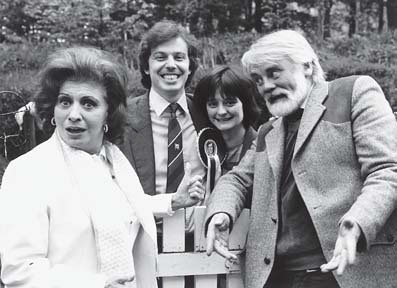At 16 I had long hair in pigtails, and was terribly thin and gawky. I certainly wasn’t a sporty kid but I was good at public speaking and drama and singing so that was the way I could be popular. I went to what they call a direct grant grammar school – there were 70 children in my primary school year and two girls got into this grammar school. Most of the children in my grammar school were better off than I was. They weren’t rich – this was a Catholic grammar school in a suburb of Liverpool – they were just better off than us. And they certainly didn’t come from a single-parent family as I did. So I was very conscious that the only way I was going to get anywhere was if I could succeed, and at that time success was defined as doing well at exams. So that was my focus.
I think I got my outgoing trait from my parents. They met when they were actors on tour. My mother had to give up her acting when my sister was born, and then when my father [well-known TV actor Tony Booth] abandoned us, when I was eight, she had to take up a job in a fish and chip shop. Thank goodness we had my grandmother, my father’s mother, who helped out with the childcare and gave us a roof over our head. But it was difficult. I don’t remember my mum really having many new clothes, she spent all her money on my sister and I. My mother left school at 14 because her own mother died, and she had to look after her 10-year-old brother and her father, who was a miner. My mum loved him, he was self-taught, he was a poet. My mum loved literature and my paternal grandmother loved reading, so we weren’t a household that didn’t have books. And my grandma always had a very strong sense of justice and right and wrong. We were always very politically aware. I joined the Labour Party when I was 16.
I didn’t really consider being an actor because I’d seen the effect of my father’s precarious career – he was very successful but sadly he spent it all on what he described as “drink and crumpet”. I was very conscious of all the sacrifices my mum and grandma made and I wanted to make sure that I had a job that would bring me financial security so I could share that financial security with them. My then-boyfriend’s mother said to me, “Cherie, you’ve always been good at debating, why don’t you think about being a lawyer?” I had no idea what that meant or involved. I’d never met anyone who was a lawyer. But I thought, that sounds like a way of using my speaking skills, and at the same time earning money.

Very few people were divorced in those days so it was a big thing to deal with when my father left my mother. He was quite famous, about to get on to Till Death Us Do Part [the popular sitcom of the Sixties and Seventies]. And my grandma’s cousin was our local parish priest so that didn’t necessarily help either. Also, without a working father we had much less money. But in another way I was very lucky because my grandfather – my dad’s father – was alive. He was very fond of my mother. I don’t think he really forgave my father for abandoning her. Even before my father left I was brought up very much as part of his family. Sometimes I wasn’t entirely sure whether my dad was my dad or my bigger brother.
The 16-year-old me used to say she was going to be the first woman prime minister. So maybe she would be surprised to find out that I never was. Or maybe she’d be surprised that I actually did make it to 10 Downing Street, albeit on my husband’s coattails. Though the better way to get there would be to do it yourself of course. Maybe she’d be amazed that I did become a QC like one of my heroes, Rose Heilbron, the Liverpudlian woman who was the very first female QC.
If I could go back and give my young self advice it might be to understand, which I didn’t until I went to the bar to do my pupillage, that in this world it’s not just about how much you know, it’s also about who you know. And I didn’t know anyone. I definitely felt the imposter syndrome at times. Just little things like going to eat the dinners at Lincoln’s Inn [the London-based, very prestigious body of lawyers] – they presented port at the end and I had no idea what it was. I just didn’t know the etiquette of lots of things. I only realise now that a lot of what we were doing in the halls and Lincoln’s Inn was what they did in Oxford colleges and public schools, but they were completely alien environments to me.










